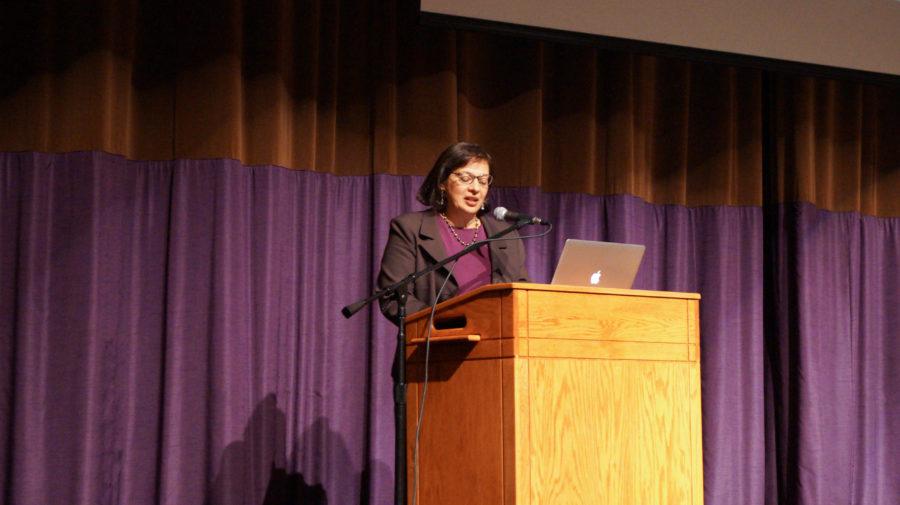Acclaimed author at UNI
Pulitzer Prize – winning author Sonia Nazario recently visited UNI to discuss her book, “Enrique’s Journey”
Apr 14, 2016
The upcoming elections have pushed immigration to the forefront of the news. But, what this recent coverage often lacked is the human touch.
On Monday, April 12, author and Pulitzer Prize winner Sonia Nazario spoke at UNI about her first-hand experiences with immigrants, aiming to educate students about the journey to safety many of them undertake.
Jennifer Cooley, professor and Spanish department advisor, said one of the reasons her department decided to invite Nazario is because Nazario’s book, “Enrique’s Journey,” is used in many classes about immigration, Latinos in the U.S., multicultural writing and literature at UNI.
One of the biggest reasons she was invited, however, was because of the impact her book had on UNI student, Walter Abrego, senior communications and Spanish double major.
According to Abrego, he was so impacted by the book that he contacted the author. After meeting her, he knew she had to speak at UNI.
The Department of Languages and Literatures sought out funding to make this possible, receiving many organizations’ support on campus including the Center for Multicultural Education (CME) and the Rod Library, among others.
“Enrique’s Journey” is a nonfiction book that looks into the daily challenges that threaten the wellbeing of families in the Northern Triangle of El Salvador, Guatemala, Honduras and Mexico.
Some of the struggles they face in these areas include poverty, hunger, lack of education and job opportunities and a harsh presence of violence, which drives many to seek better opportunities outside their homelands.
“For me, an important issue is that the immigration/refugee crisis in the Americas is underreported and is seldom presented as such,” Cooley said. “The humanitarian crisis in Central America and Mexico is almost never discussed in these terms, yet people are living with constant threats to their well-being and violations of basic human rights.”
In the event itself, Nazario gave a brief background of her childhood. She was a child of two migrants who moved to the U.S. from Argentina. Her family lived in the U.S. until she was 12, and then moved back to Argentina after her father passed away.
After Nazario witnessed two journalists murdered by Argentinian government officials, she decided that she was going to be a journalist so she could report on these tragedies in hopes that the awareness would make the murders, rapes and torturing in her country cease.
Nazario moved back to the United States, went to Williams College and became the youngest writer for the Wall Street Journal.
Nazario decided to put her investigative journalism to the ultimate test, and took a dangerous journey that many migrants still embark on today. She hung atop a train in Central America that took her and thousands of other migrants up north.
She spoke to many people, including a boy named Enrique, which was what sparked the subject of her book.
Enrique, along with others, fought for their lives to make it to safety and reunite with their families in the U.S.
Nazario also spoke of immigrants who traveled many miles only to get rejected by border control and deported back to their countries, where their opportunities were extremely limited.
Freshman Avery Christianson didn’t realize how dangerous the countries that immigrants come from really are.
“I thought Nazario was super inspirational,” Christianson said. “I think every American should know what happens to those in third world countries because it would make it more understandable why they are coming to the United States.”
Freshman Spanish major Connor Lang said Nazario’s speech made him think about immigration in a new way.
“I do think our country should have more sympathy for the immigrants from Central America,” Land said. “However, I also think we as a country should work to fix the roots of the problem so these people don’t feel the need to flee from their countries in the first place.”








